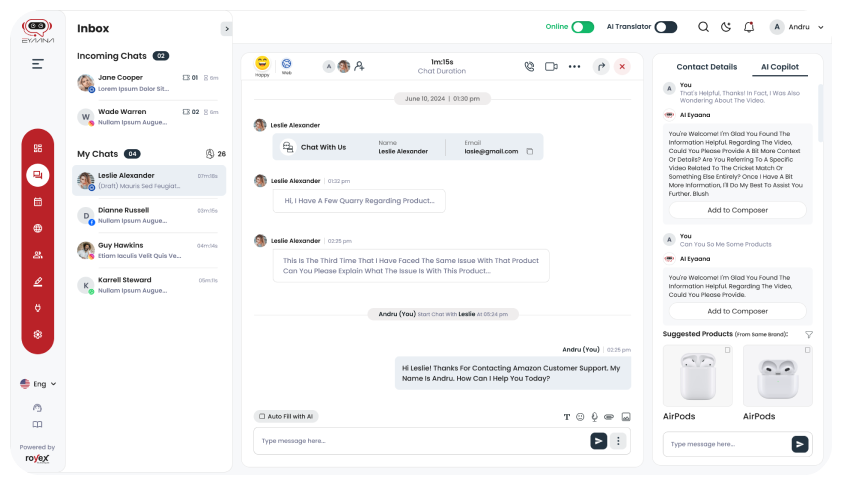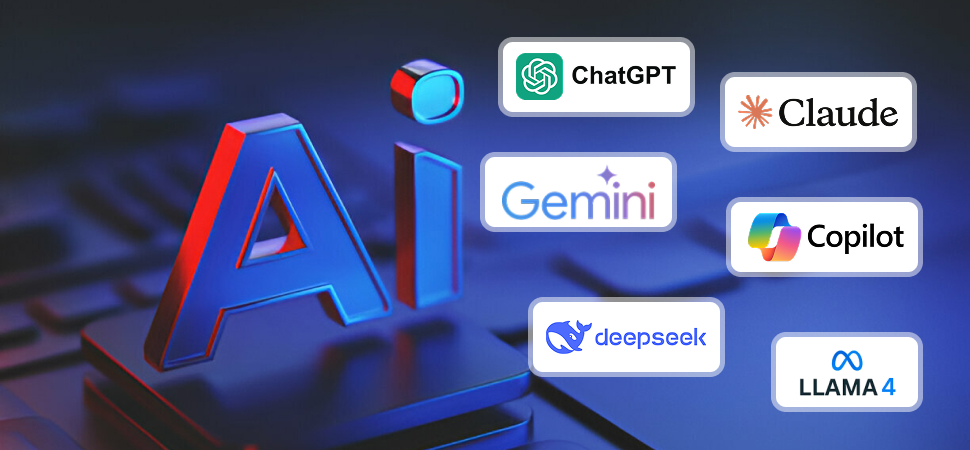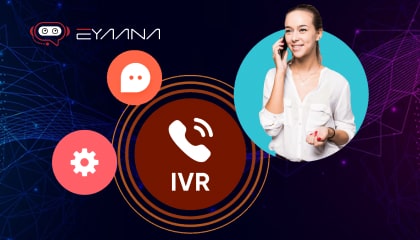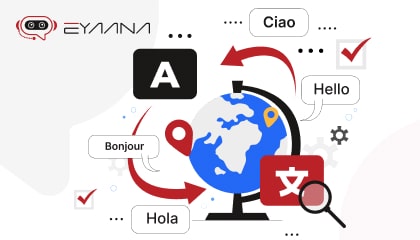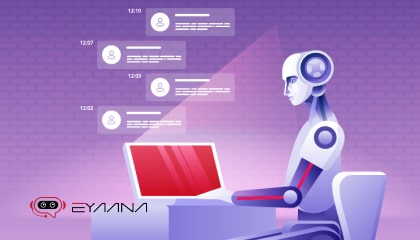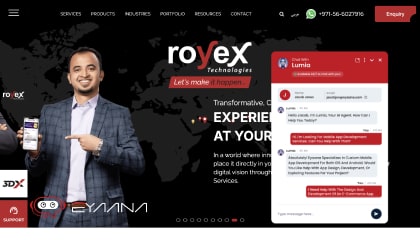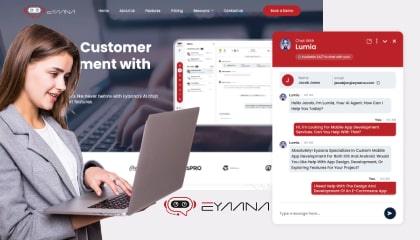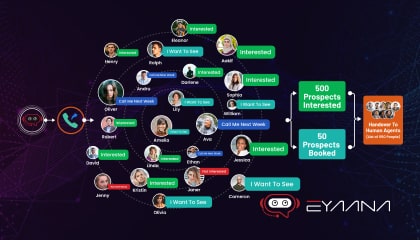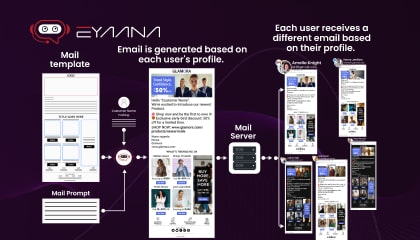Enquiry
Blog Details
How Does Eyaana Help You Manage Sales Leads Effortlessly?
Managing sales leads can be challenging, but Eyaana makes it much simpler. It’s an AI-First sales and customer support platform that helps you gather leads from different sources—like websites, emails, or social media—without manual effort. The best part? Eyaana automatically organizes, qualifies, and prioritizes your leads, so you know which ones are most likely to convert.
With its automated follow-ups, personalized communication, and reminders, you stay engaged with your prospects. Eyaana also integrates with popular CRMs, making it easy to track the sales process. You can automate routine tasks, keep tabs on your sales pipeline, and get real-time reports on lead performance. Plus, our platform is customizable. Whether you’re a small business or a growing enterprise, Eyaana scales with you.
In this we will learn how Eyaana eliminates the guesswork and manual labor from sales lead management, freeing your team to focus on closing deals.
Understanding the Challenge of Sales and Support
![understanding-the-challenge-of-sales-and-support-min[1].jpg](/media/jidnnyet/understanding-the-challenge-of-sales-and-support-min-1.jpg)
In today’s fast-paced business landscape, sales and support teams face unique challenges that can impact a company’s growth and customer satisfaction.
Balancing Sales and Support Needs
One of the primary challenges in managing sales and support is balancing the needs of both functions. Sales teams are focused on closing deals and generating revenue, while support teams aim to resolve issues and ensure customer satisfaction. When these teams operate in silos, it can lead to misunderstandings and inefficiencies. For instance, if a sales representative promises a feature that the support team is not equipped to deliver, it can result in customer dissatisfaction and lost trust.
Maintaining Communication
Effective communication between sales and support teams is essential, yet it is often lacking. Sales representatives may not be fully aware of the product’s limitations or the issues that customers frequently face. Similarly, support teams may lack insights into customer needs and expectations that sales teams gather during their interactions. This disconnect can create gaps in service, resulting in frustrated customers and missed opportunities. Establishing regular meetings and integrated systems can help bridge these communication gaps.
Managing Customer Expectations
Both sales and support teams must work to manage customer expectations. Sales teams are often driven to close deals and may sometimes overpromise on capabilities or delivery times. On the other hand, support teams must handle these expectations by providing realistic timelines and solutions to issues. Failure to align on what can be delivered can lead to customer disappointment. Clear communication and setting realistic expectations from the outset can help mitigate this issue.
Technology Integration
With the rise of digital tools, integrating technology across sales and support functions is crucial. Many organizations still use separate systems for managing sales leads and customer support inquiries, which can lead to data fragmentation. Without a unified platform, teams may struggle to share critical information, making it difficult to provide a seamless customer experience. Adopting integrated solutions, such as customer relationship management (CRM) systems, can help centralize information and facilitate collaboration.
Training and Skill Development
Both sales and support teams require ongoing training to stay updated on product features and industry trends. However, companies often invest more in sales training, leaving support teams underprepared to handle complex queries or new product releases. This imbalance can affect the quality of support provided and may lead to increased escalations and customer frustration. Investing in comprehensive training programs for both teams ensures they are equipped with the necessary skills to serve customers effectively.
Adapting to Customer Feedback
Customer feedback is vital for both sales and support teams to understand their performance and areas for improvement. However, effectively gathering and implementing feedback can be challenging. Sales teams may collect insights on customer needs and preferences during the sales process, while support teams often receive feedback regarding product issues. Without a streamlined process for sharing this information, opportunities for improvement may be overlooked. Establishing a feedback loop between the two teams allows for more responsive adjustments to sales strategies and support processes.
What Sets Eyaana Apart?
Eyaana is more than just an AI tool; it's a strong platform designed to manage all types of customer interactions much better than regular chatbot apps. While basic AI chat systems can only answer simple questions, Eyaana uses advanced technology to understand more complex customer needs. For example, if a customer asks, “Can you help me find a product that fits my budget?” Eyaana can grasp the situation and suggest products that match.
Eyaana does more than just answer questions; it can handle several tasks at once. For instance, when a customer starts a chat about a specific product, Eyaana can tell if they want detailed information (for sales) or help with an existing order. Based on this, it can either help close a sale or create a support ticket for more assistance.
Our platform combines many tools into one system, including chat support, help from human agents, sales management, ticketing, and appointment scheduling. This means Eyaana isn’t just solving one problem at a time; it helps businesses reach their goals, whether that’s making a sale, scheduling a meeting, or solving customer questions. For example, if a customer wants to know about a product and also wants to set up a demo, Eyaana can do both in one conversation.
What makes Eyaana special is its goal-focused AI system. Businesses can set it to aim for specific results, like booking meetings, sending proposals, or closing deals. During chats with customers, Eyaana works toward these goals. For instance, if the goal is to book a meeting, Eyaana will guide the conversation to find a time for a follow-up call. Plus, Eyaana's AI keeps learning and improving, so it doesn’t just give standard answers but grows smarter through real-time feedback, helping it understand customers and business goals better over time.
Eyaana also supports human agents with an AI advisor that offers instant suggestions based on the company’s information. This is especially useful for agents who might not know all the answers; they can use AI support to help them respond better and faster to customers. For example, if an agent isn’t sure about a product's features, Eyaana can quickly provide that information, helping the agent assist the customer effectively.
By training its AI with information about customers and how they communicate, Eyaana ensures a personalized and consistent experience. Instead of a one-size-fits-all approach, businesses can upload their data and customize the AI to reflect their unique voice and style. This way, customers feel like they’re interacting with a real representative of the company, building trust and satisfaction.
Key Components of Eyaana’s Sales Automation & Support
![key-components-of-eyaanas-sales-automation-and-support-min[1].jpg](/media/ztmgbm1t/key-components-of-eyaanas-sales-automation-and-support-min-1.jpg)
Eyaana's Sales Automation & Support is designed to revolutionize how businesses manage leads and streamline their sales processes through a combination of innovative features and AI-driven tools.
Automated Lead Management: Eyaana’s Sales Automation & Support feature begins with automating lead management, ensuring that no opportunity is missed. Our platform automatically captures leads from various sources, such as website forms, social media, and email campaigns, and organizes them into a centralized database. Eyaana then assigns leads to the appropriate sales representatives based on predefined criteria, such as geographic location, industry, or product interest. This automation not only saves time but also ensures that leads are handled promptly and by the right team members.
AI-Powered Lead Scoring: Eyaana leverages AI to analyze and score leads based on their likelihood to convert. By considering factors such as demographic information, online behavior, and past interactions, Eyaana’s AI can prioritize leads that are most likely to result in sales. This lead scoring system helps sales teams focus their efforts on high-potential prospects, improving efficiency and increasing the chances of closing deals.
Personalized Sales Outreach: With Eyaana, sales teams can create personalized outreach campaigns tailored to each lead’s specific needs and preferences. The platform’s AI tools can suggest personalized messages, content, and offers based on the lead’s behavior and history. By delivering highly relevant and targeted communication, Eyaana enhances the effectiveness of sales outreach, leading to higher engagement and conversion rates.
Automated Follow-Ups and Reminders: Eyaana ensures that no lead falls through the cracks by automating follow-ups and reminders. The platform can schedule and send follow-up emails, messages, or calls at optimal times, keeping prospects engaged and moving them through the sales funnel. Eyaana also provides sales representatives with reminders for important tasks, such as sending proposals, scheduling meetings, or following up after a demo. This automation reduces the risk of human error and ensures that leads are nurtured consistently.
Real-Time Sales Insights: Eyaana provides sales teams with real-time insights into their performance, enabling them to make data-driven decisions. The platform offers detailed analytics on key metrics, such as lead conversion rates, pipeline velocity, and deal size. Sales representatives can use these insights to identify trends, optimize their strategies, and forecast future sales with greater accuracy. Eyaana’s real-time data helps sales teams stay agile and responsive in a competitive market.
Seamless CRM Integration: Eyaana integrates seamlessly with existing CRM systems, allowing businesses to synchronize their sales data and workflows. This integration ensures that all customer and lead information is up to date and accessible across the organization. Sales teams can leverage Eyaana’s automation and AI tools while continuing to use their preferred CRM platform, making it easier to manage relationships, track interactions, and close deals.
Sales Pipeline Automation: Eyaana automates the management of the sales pipeline, providing sales teams with a clear and organized view of their opportunities. The platform tracks the progress of each deal, automatically updating the pipeline as leads move through the stages of the sales process. Eyaana also identifies bottlenecks and provides recommendations for accelerating deals, helping sales teams maintain momentum and close more deals in less time.
Document Automation and E-Signatures: Eyaana simplifies the sales process by automating the creation and management of sales documents, such as proposals, contracts, and quotes. The platform allows sales teams to generate customized documents quickly and accurately, reducing the time spent on administrative tasks. Eyaana also supports electronic signatures, enabling customers to sign contracts digitally, streamlining the closing process and reducing delays.
Conclusion
Eyaana, ai lead generation software simplifies the complexities of lead management, offering businesses a powerful solution that brings structure, automation, and data-driven insights to the sales process. By centralizing leads, automating assignments, and providing actionable analytics, Eyaana helps companies manage their sales leads effortlessly, enhancing productivity and boosting conversion rates. For businesses aiming to optimize their lead management and drive revenue, Eyaana proves to be an indispensable asset.
To explore how AI can enhance your business operations, sign up for free and get started with Eyaana today.
Do you need help?
We will provide detailed information about our services, types of work, and top projects. We will calculate the cost and prepare a commercial proposal.
